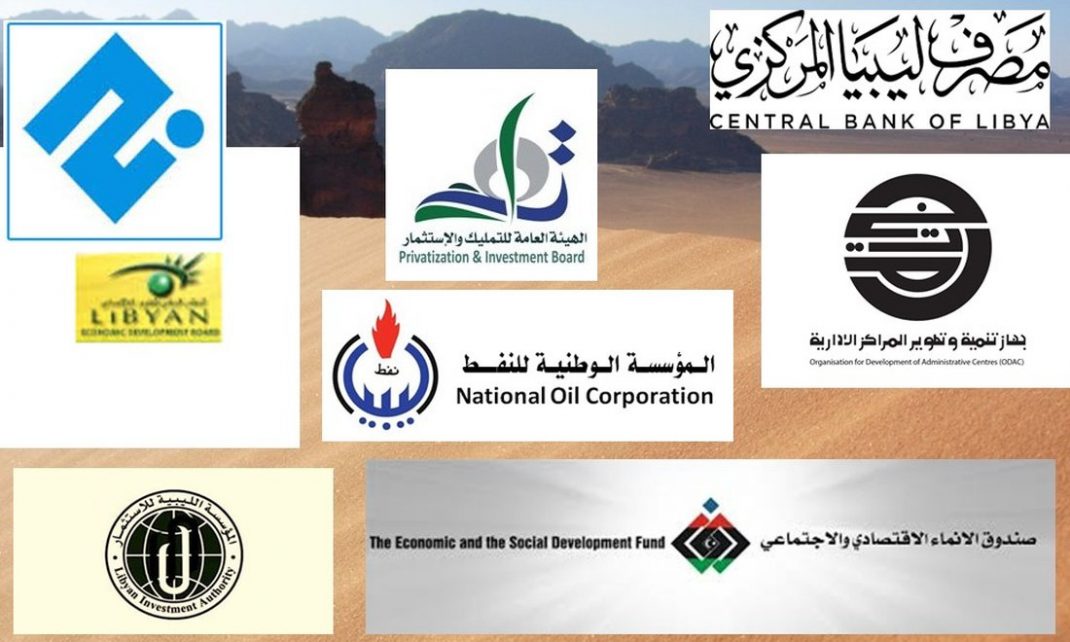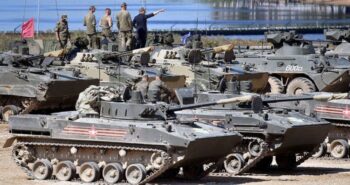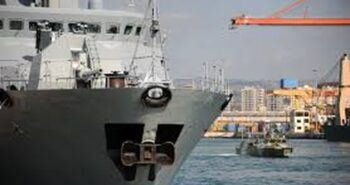By Jason Pack
 This paper argues that peace in Libya can be achieved via a Libyan-led International Financial Commission empowered with the tools to compel transparency and reform Libya’s institutions and dysfunctional incentive structure.
This paper argues that peace in Libya can be achieved via a Libyan-led International Financial Commission empowered with the tools to compel transparency and reform Libya’s institutions and dysfunctional incentive structure.
.PART ONE
For the last five years, the international community has tried a range of different approaches to mediating the Libyan civil war — sometimes via the UN, while at others via one-off summits convened by major states.
At different times, these mediation efforts have emphasized political, stakeholder, and security-focused tracks, as well as electoral or population-centric approaches.
Most have offered major carrots for success, while some have threatened minor sticks against spoilers. All have failed.
Most nations and observers not actively fueling the war with weapons, money, training, and mercenaries now see that halting these destructive flows is critical to bringing the rival militia factions to the negotiating table.
The current UN arms embargo is now being openly flouted by several nations to the point that they publicize and hold parliamentary votes on some of their violations.
The Berlin conference slated for February 2020 has the creation of an effective arms embargo as its stated primary goal.
As challenging as that will be, it is potentially achievable with concerted diplomacy and the imposition of genuine penalties for violations by the U.S., Britain, and others to dissuade the Emiratis, Egyptians, Turks, Qataris, Sudanese, Chadians, Russians, and others from further meddling.
However, merely meeting this challenge will not be enough to stem the violence or solve the conflict.
Once militias are cut off from external sources of military support, the core economic issues that gave rise to the conflict will still remain.
Only a new approach empowering Libyan economic reformers, while reworking the Libyan economic system’s role as a driver of conflict, can fix the dysfunction.
And yet, even courageous and far-sighted Libyan technocrats will not be able to implement the necessary reforms themselves, as long as they are effectively held hostage by the militias that benefit from the current system.
International actors need to facilitate and support the establishment of a Libyan-requested, Libyan-led International Financial Commission (IFC) vested with the requisite authorities to completely restructure the economy. This will require including the militia commanders who wield real power in Libya.
Such horsetrading with power brokers can only succeed in an environment where these commanders are already cut off from the foreign intervention which appears to hold out the promise of allowing them to conquer the entire country without negotiating.
Fortunately, the Berlin conference is already scheduled to include an economic track.
Rather than it being relegated to the status of a side show or parallel approach to complement political engagement, the economic track should directly support the immediate priority of securing a functional arms embargo by demonstrating to foreign supporters of all factions that a non-zero-sum solution is possible, and indeed preferable, to their destructive efforts to secure the illusory goal of total power for their favored faction.
The most two meddlesome foreign powers are often motivated by economic issues including securing payment for old contracts — so the fallacy of zero-sum economic or political thinking drives both the Libyan militias as well as their external backers.
Furthermore, properly tying economic reform to conflict resolution can develop momentum for creation of the IFC.
Any agreement stopping damaging foreign intervention in Libya is unlikely to hold without a new, constructive mechanism for foreign powers to secure their important economic and security interests in the country via positive-sum mechanisms in a way that would benefit the Libyan people and international stability.
MASTERING THE PROBLEM SET
Diagnosing the Crux of the Problem: In bullet points
A New International Approach is Needed
• As Libya’s post-Gadhafi chaos has failed to offer up any legitimate social contract to the Libyan people, a perversion of the pre-existing Gadhafian social contract has emerged.
Each Libyan region, locality, tribe, ideological grouping, and individual feels that they are as entitled as anyone else to the money and power vested in Libya’s semi-sovereign institutions.
Communal leaders do not care that the rationales for those institutions no longer exist, they simply want their piece of the pie.
• This truth has gradually dawned on most Western policymakers concerned with Libya: the root of the country’s stymied transition and its post-2014 War of Post-Gadhafi Succession is primarily economic — not political or ideological.
• Future peacemaking efforts, national conferences, or even direct elections are doomed to failure if they do not address the root causes of Libya’s malaise: bad economic incentives and flawed institutions.
• The Berlin conference is already poised for failure if it does not provide a coherent approach to treating the economic issues.
Yes, there are signs that things are moving in the right direction as a distinct economic track will be included. But this is not sufficient.
The economic track must give rise to institutions with permanent engagement in Libya’s economy rather than sporadic engagement via occasional summitry.
The Military and International Lay of the Land
• General Khalifa Hifter’s April assault on Tripoli has morphed from a spontaneous attack by a rogue general into the world’s first extraterritorial drone war of attrition.
It is non-Western powers that provide the weapons and technical know-how to keep their clients afloat. The aerial component of the war is being primarily contested between the United Arab Emirates (UAE) and Turkey, while the mercenary and training components of that war pit Russia, Egypt, and Sudan against Turkey and Chad.
• Turkey has become the backstop of the Government of National Accord (GNA), as the U.S., UK, Italy, and Algeria have apparently rebuffed Prime Minister Fayez al-Serraj’s requests for the necessary military assistance to prevent Tripoli from falling.
It now appears that if Tripoli is in danger of being taken by Russian-backed mercenaries that Turkey will rush sufficient ground troops to prevent that outcome.
• As the war has evolved, European nations have been eclipsed as the most involved international players in the “Libya file,” and hence, German and European attempts to mediate must be backed-up with hard power gambits or they will be brushed off by competitions with military leverage on the ground.
In short, too-little too-late re-engagement from Europe without application of uniquely Western forms of leverage will merely showcase the extent to which non-Western countries are the ones now able to project power into Libya.
They can flout UN arms embargoes to provide drones and mercenaries or flout international norms by providing direct injections of cash or illicitly printed dinars.
• Western nations, especially if acting in concert, would have a stranglehold on the licit economic tools that are needed to compel both sides to work together and to provide the levers and technical expertise to eliminate the economic drivers of the conflict in Libya.
Why Libya Matters and Why Now?
• Of the world’s five major conflicts — Ukraine, Syria/Iraq, North Korea, Yemen, and Libya — Libya is the only one whose solution can pay for itself.
Solving the Libya conflict would result in an extra million barrels a day of sweet crude, over a hundred billion dollars of yearly spending on mega-projects, employment for a million guest workers, and back-payments in the hundreds of billions.
• Moreover, Libya’s continuing cycle of violence and statelessness has created one of the most important hubs for extremist actors outside of the Levant, while also facilitating arms proliferation, migrant trafficking, and major international crime networks.
At present Libya is a major exporter of instability into the Mediterranean and Sahel regional systems. If it were stable with a functional economy, it would be a primary pillar of stability for both.
• For all these reasons, the time has come for America and its closest allies to pivot toward an economic-focused approach to peacemaking in Libya. It is the only avenue which might provide the incentive structures for peace and undercut those for violence.
It can be done at either the international community level or by some likeminded countries at the bi- and multilateral levels. Britain, Italy, and European institutions must be key to any process.
• The upcoming Berlin conference needs to propose a way out of the current impasse which effectuates more than a momentary cease-fire or signing ceremony, but deals with the core of the problem that led to the current war in the first place.
The Economic Angle as a Silver Bullet
• To fix the Libyan economy, we must grasp its very essence. The structure of the Gadhafian economy was always an uncoordinated attempt at buying off the country’s different social segments and creating complex vehicles of patronage.
• The Libyan economic system has not been reformed in any meaningful way since the 2011 Uprisings. It needs root and branch economic reform. Having a power sharing arrangement between leaders in Tobruk and Tripoli who have both long overstayed their mandates will not address this issue.
Even courageous and far-sighted Libyan technocrats and leaders will not be able to implement the necessary reforms themselves as long as they are effectively held hostage by the militias that benefit from the current system.
• Libyan reformers and leaders will, therefore, need to initiate the way forward by calling for the help and assistance of outside technocrats and the power of major international governments and institutions.
• Holding elections without fixing the Libyan economy’s unique forms of dysfunction is simply a recipe for intensifying the ongoing war over access to the fonts of corruption, i.e. the Central Bank of Libya (CBL), the Ministry of Finance, the Budget Committee, and the Audit Bureau.
Those positions need to be insulated from any military or electoral free-for-all. Moreover, before any short-term pain for long-term gain economic reforms are initiated, the technocratic Western-backed appointees to these crucial positions need to be separated from the political process via the IFC, which can take the heat when unpopular measures need to be implemented.
• For economic reform to take hold, international actors cannot just work with existing interlocutors. The problem is that apart from the National Oil Corporation (NOC), all of Libya’s major semi-sovereign economic institutions are as deeply broken and counterproductive as they are entrenched.
A new economic framework and new interlocutors must be created by reforming existing institutions. This is the task of the proposed IFC.
• By what right can international actors tell Libyans, or guide them, concerning how to reform their economy?
One school of thought holds that the international community, and the UN in particular, after the fall of the Gadhafi regime and the failure of a non-interim sovereign government to emerge are effectively obligated to act as in loco regis for the vacant Libyan sovereign (as they did in the period 1947-51 after Italy was forced to abnegate its claims to sovereignty after losing World War II, but before an independent Libyan state was formed).
• Rather than holding more rounds of diplomatic conferences and peace negotiations, major regional and international powers need to rally around the establishment of the IFC with its headquarters in either Malta, Tunis, or London.
• Both Russia and Turkey have billions of dollars of contracts with the former regime and in some cases with postGadhafi governmental entities.
Total loss of those contracts is unacceptable to them, whereas fighting to gain a privileged position to get paid for both old contracts and obtain new ones provides a strong incentive to support a militia coalition they believe can secure these for them.
Convincing these outside powers that a stable Libya is actually a win-win will be difficult, but reason supports this argument.
Russia, Turkey, and others are far more likely to get some economic benefit from a stable Libya, not controlled exclusively by any given militia coalition, than from a country riven by civil war.
The Libyan people, rival outside creditor nations, and international stability will all benefit from the same solution as well.
• Libyans need to know that the world is not only interested in them for what they export (crude, arms, migrants, jihadis), but for the domestic well-being of Libyans and the health of the Libyan economy and body politic.
Furthermore, in the long run fixing Libya will pay for itself, and the IFC should be funded partially by Libya’s sovereign wealth.
Nonetheless, the major powers should be willing to put effort and funds in upfront to show Libyans that this new peacemaking approach “is for real.”
This money will be essential to smooth the disruptions and deprivations that will otherwise emerge from the shock therapy of reforms that the Libyan economy needs.
***
Jason Pack is a consultant, author, and commentator with over two decades of experience living in, and working on, the Middle East. His articles have appeared in The New York Times, The Wall Street Journal, The Spectator, The Financial Times, The Petroleum Economist, The Guardian, Foreign Policy, and Foreign Affairs.
_________





